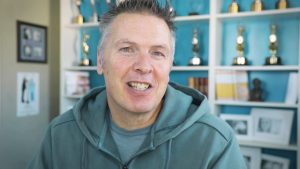
Today’s Question comes from Allyson. She wanted to know:
“How do I visualize paying off debt, without creating a subconscious desire for MORE debt to pay off?”
In her words:
I’ve been listening to your Science of Getting Rich Program over the last couple of weeks and have a question for you.
This next year my husband and I want to create financial freedom, which to us looks like a zero balance on all the credit cards and everything paid off. What we’re bumping up against is we keep visualizing the victory with paying off credit cards, and we don’t want to train our mind into seeking more debt for that thrill of paying it off.
But financial freedom feels so esoteric to us that I am having a hard time pinning down an emotion associated with financial freedom. I’ve thought about what I want life to look like when there are no more debts, and it’s just that everything is normal, I feel secure and I sleep well every night, we are able to invest, and we’re able to pay a lot in tithing and fast offerings and so forth… but it doesn’t carry the emotional thrill that having zero debt has.
Can you help me reframe this, please? I KNOW we can create financial freedom this year. I want to make sure we’re not future sabotaging by the emotion we’re connecting to the visualization, or that we’re visualizing the wrong thing.
Thank you so much! – A.C.
Here’s my Answer:
One of the best pieces of advice I got on this was to spend energy picturing and planning the details of life “after”, and get excited about the feelings associated with normal life. But sometimes nothing else sounds quite as exciting, so I do get that it’s important to be emotionally invested in getting out of debt. I don’t know if this is necessarily the best way, but I’ll tell you how we finally did it. And I’m sorry, it’s kind of rambling without editing, so I hope it’s helpful:
We listened a lot to Dave Ramsey (which was painful at first, but eventually allowed us to get REALLY excited about being out of debt, WITH the new mindset that also kept us from sabotaging ourselves when the goal was achieved. It’s good medicine. Best of both worlds, in my opinion.
We first made a commitment to stop using credit to tide us over if we came up short in any given month. This commitment was before we tried to pay anything off, I think. It meant that we had to use “rare faith” a LOT. Every month, for a while in fact, until we started noticing that miracle after miracle, the principles were proving to be dependable, as long as we kept to the commitment and expected another miracle. …I had never realized what a shift in mentality that required for us, because we were coming from an “investing” mindset – using other people’s money to invest for high returns. (Which, we did really well at for a while, until we got caught in the recession and people couldn’t pay money that they owed us, and the dominoes began to really fall.)
We also had to get serious about budgeting. How on earth would we do that when our income was unpredictable?? We decided we’d just do our best. So it meant looking back over the year and coming up with average monthly dollar amounts for all the predictable expenses. We were barely making it with our business income, and when we came up short, I’d just run a promotion or something, so how do I budget when I’m so used to being reactionary to our needs? We got those monthly figures, and then decided on a monthly amount that the business had to make – so it meant setting up an automatic transfer from business to personal every two weeks.
This freaked me out at first because I thought, “Well, what if the business doesn’t make that much?” and “What if I don’t feel motivated to make more than the bi-monthly draw?” And the first month, it was patchy. I had to scramble to make enough before the transfer hit, which was new because I wasn’t scrambling to pay a bill, I was scrambling to pay myself.
Something about that helped with another mindset shift I needed – because I was scrambling to pay MYSELF instead of scrambling to pay a bill (even though the result was the same). I scrambled again to make enough in time for the second draw. And I didn’t really earn more than the bare minimum.
But after that first month, something felt different. I started working for the joy of it again, knowing that the draw would automatically cover my bills, and I found myself wondering how much more I could make, just for fun. Our financial planner told me to “Let the business account build up”, so no matter how much I generated, I was still only allowed to spend the fixed monthly budgeted amount. That was a new concept to me. (Because previously I was always just reacting to our needs.) So that’s what the budget did for me – it stopped me from thinking so much about bills, and helped me get back to just creating.
The next month I did really well, but still only received the fixed draw into my personal account. The business account started to grow and grow. THAT did a lot for my psyche. Out of the budgeted amount, certain amounts went to paying off bills, and as things started going better, I got a real charge out of paying off debts early. We started to get a bigger charge out of saving, too. This was a new experience for us. I made more rules for myself – like if I generated a certain amount of revenue by the end of the year, I’d give myself a bonus. Otherwise the money stayed in the business account, which was nice because then I had reserves I could use for investing more in my business – product, hired help, etc. It also made it so that the tax bill at the end of the year wasn’t a giant blow to our pocketbook – there was money saved and enough to cover the tax bill and to spare.
Anyway, we felt like step one had to be learning how to live with the new system of paying myself, and within these budgeting restrictions (something that ran counter to the “abundance mindset” – but again, it felt like necessary short-term medicine for our long-term wealth plan).
So the short answer is this. If you want to be really excited about paying off debt, you CAN. But keep it paired with a constant reminder of the principles that build a wise and solid foundation. Follow Dave’s Baby Steps. I used to think he was only about budgeting for people on limited incomes. But he’s more about wealth building – it’s just that too many people skip the steps that build a solid foundation, so that’s why he hammers that part so much. Too often I see people get caught up in the excitement about paying off debt without the education (and pants-kicking) that keeps them wise afterwards, and they get sucked back into the same problems over and over again. Pulling rabbits out of the hat to keep fixing debt problems does work, but it becomes exhausting.
So if your vision is a normal, peaceful, joyful abundant life, then submit yourself to Dave’s podcast (if you aren’t already listening to him). Like I said, it can be painful in the short term, but it’s really made all the difference for us in the longer term. It keeps us in check, and has really added to my ability to live the normal peaceful life I always wanted.
Related: My Public Apology to Dave Ramsey
- New England’s Dark Day - July 6, 2024
- Something was missing - June 17, 2024
- A goal to find a goal - June 14, 2024
















